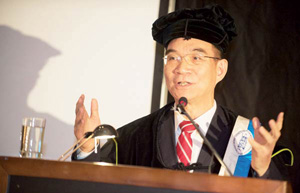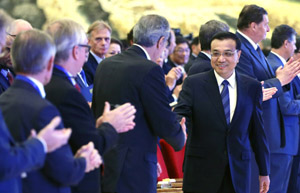BEIJING - Foreign direct investment (FDI) into the Chinese mainland dropped 14 percent in August from a year earlier, settling at 7.2 billion, the Ministry of Commerce (MOC) said on Tuesday.
The data, following a 17 percent slump in July, marked the lowest volume in nearly five years. It is a sign that investors are growing more cautious over the softening strength of the world's second-largest economy.
For the first eight months, FDI, which excludes investment in the financial sector, stood at $78.34 billion, down 1.8 percent from the same period last year, the ministry said.
In response to a question on whether foreign capital is leaving China, MOC spokesman Shen Danyang said there are no current statistics to support that claim.
"We are still analyzing related investment and trade flows. Currently, there are no abnormal changes," he noted.
Around 55 percent of the FDI went into the country's service sector during the Jan-Aug period. FDI into the manufacturing sector dropped 15.7 percent to $27.5 billion, accounting for 35 percent of the total.
FDI from major economies slipped, including a 16.9 percent drop from the United States and a 17.9 percent fall from the European Union. Investment from Japan went down 43.3 percent to $3.16 billion in the first eight months.
In contrast, China's outbound direct investment by non-financial firms surged 112.1 percent to? $12.62 billion in August.
The weaker-than-expected FDI data came as China's key economic indicators have pointed to a slowdown in growth momentum in the third quarter following a rebound in the second quarter.
Data over the weekend showed China's value-added industrial output decelerated sharply to 6.9 percent year on year in August, down from 9 percent growth in July, adding further signs of softening strength in the economy after manufacturing activities slowed.
In view of the sluggish activity, Barclays has lowered its 2014 growth forecast for China to 7.2 percent.
Tuesday's data also came amid concerns that China's attitude toward foreign firms may be changing following its anti-corruption probe against GlaxoSmithKline (GSK), and anti-monopoly investigations into top global brands such as Microsoft, Jaguar Land Rover, and Qualcomm.
Although the probes are not specifically targeting foreign firms, and Chinese leaders have on many occasions clarified the actions, many foreign companies have still complained of unfair treatment.
In a speech at the Summer Davos opening ceremony last Wednesday, Chinese Premier Li Keqiang reiterated that China will follow a stable and more open policy on foreign capital.
"We will continue to improve and standardize the business environment in order to attract more foreign businesses and investment and draw upon and adopt advanced technologies, mature managerial expertise and fine cultural achievements from other countries," said the premier.
|
 |
 |
| Economist who swims against tide | Improved quality 'key to growth' |
